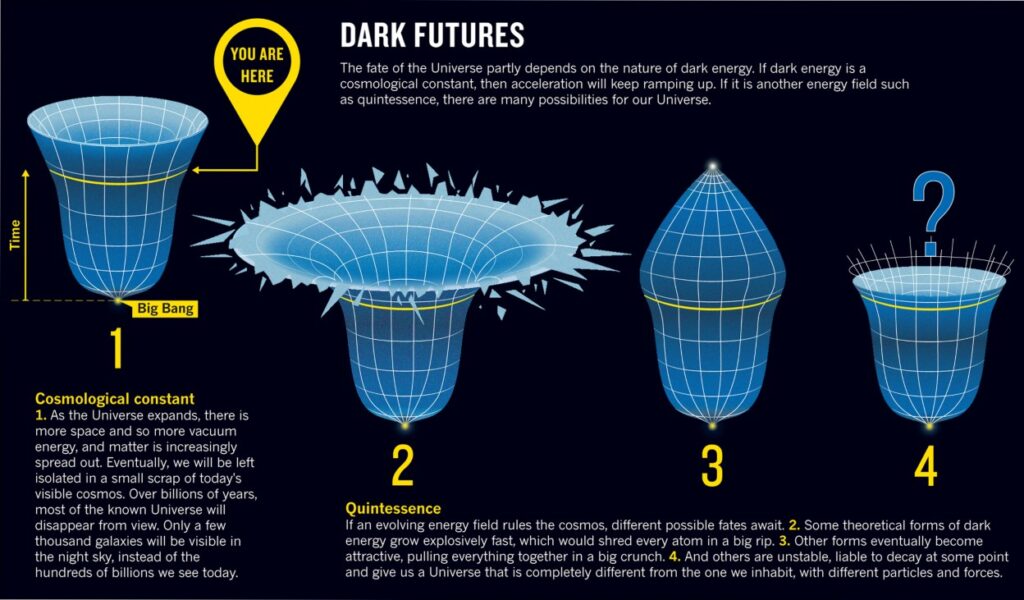Dark energy is one of the most mysterious and fascinating components of our universe. Discovered in the late 20th century, dark energy is believed to make up about 70% of the universe’s total energy content. This elusive force is responsible for the accelerated expansion of the universe.
Stick around, and we’ll dive into these amazing space secrets together!

How Dark Energy Affects the Universe
The impact of dark energy on the universe is profound. As scientists have observed, cosmic acceleration is a direct result of dark energy. This means that the universe is expanding at an ever-increasing rate. Observational evidence from supernovae, redshift, and the cosmic microwave background supports this conclusion. Understanding these observations helps us predict the ultimate fate of the universe.
Theories and Models of Dark Energy
Several theories and models attempt to explain dark energy:
- Cosmological Constant (Lambda): Introduced by Einstein, this theory suggests that dark energy is a constant energy density filling space uniformly.
- Quintessence: This model proposes a dynamic field that changes over time.
- Alternative Theories: These include concepts like phantom energy and Chaplygin gas, which offer different explanations for dark energy’s behavior.
Dark Energy vs. Dark Matter
It’s crucial to differentiate between dark energy and dark matter. While dark energy drives the universe’s expansion, dark matter works in opposition, exerting a gravitational pull that slows down this expansion. Both are invisible and detectable only through their gravitational effects, but they play very different roles in the cosmos.
Measuring Dark Energy

Measuring dark energy is a challenging task. Scientists use tools like the Hubble Space Telescope and missions such as the Planck Mission. Key observational techniques include redshift, gravitational lensing, and baryon acoustic oscillations. Each method provides valuable insights, although measuring dark energy’s exact properties remains difficult.
Theoretical Frameworks and Mathematical Models
Theoretical frameworks are essential for understanding dark energy. Einstein’s Field Equations and General Relativity provide the foundation. The Lambda-CDM Model and Friedmann Equations further describe the universe’s expansion, incorporating dark energy into their calculations.
Recent Research and Discoveries
Recent research has brought exciting discoveries about dark energy. Projects like the Sloan Digital Sky Survey and the Dark Energy Survey are at the forefront. These initiatives have uncovered key findings that influence our understanding and shape future research directions.
The Role of Dark Energy in the Universe’s Evolution
Dark energy has played a significant role since the universe’s early days. During cosmic inflation, it influenced the large-scale structure formation. Looking ahead, dark energy will continue to shape the universe, affecting its evolution and ultimate fate.
Dark Energy in Popular Culture and Media
Dark energy also captivates the public imagination. Representations in science fiction often depict it as a powerful and mysterious force. These portrayals influence public understanding and highlight the importance of scientific communication.
To sum it up, dark energy is a mysterious force speeding up our universe’s growth. We learned about its effects, the theories behind it, and how scientists measure it. I hope this article cleared things up for you. For more cool space stuff, keep visiting galaxysecrets.com. Feel free to leave a comment, share this with friends, or explore more of our content. Let’s keep discovering the secrets of the galaxy together!

Frequently Asked Questions About Dark Energy
What are the Theories Behind Dark Energy?
Several theories attempt to explain dark energy. The most prominent is the cosmological constant, a term Einstein added to his equations of General Relativity. Another idea is quintessence, a dynamic field that changes over time. Both theories have their challenges and are the focus of ongoing research to better understand this elusive force.
How Do We Measure Dark Energy?
Scientists measure dark energy using various methods. One key technique is observing the redshift of distant galaxies. The Hubble Space Telescope and the Planck Mission provide critical data for these observations. Researchers also use baryon acoustic oscillations and gravitational lensing to gather more information on how dark energy influences the cosmos.
Are Dark Energy and Dark Matter Related?
Dark energy and dark matter are distinct components of the universe. Dark matter exerts gravitational force, helping to hold galaxies together, while dark energy causes the universe to expand. Although they are both invisible and detected indirectly, they play different roles in cosmic evolution.
Sources








